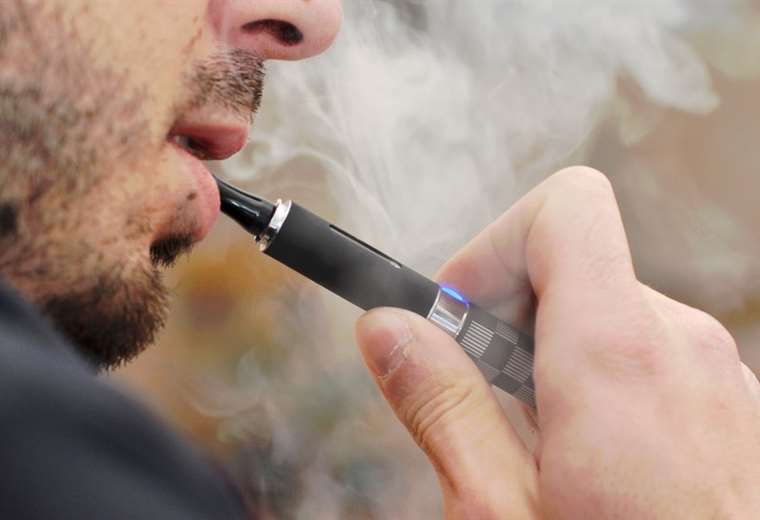August 24, 2022, 10:57 AM
August 24, 2022, 10:57 AM
The calls “healthy vapes” are becoming more and more popular. Unlike traditional e-cigarettes that contain nicotine, these products contain vitamins, hormones, or essential oils.
However, the unproven claims of the companies that market these devices, which ensure that they are beneficial to health, alerted the US Food and Drug Administration (FDA, for its acronym in English).
Healthy vaporizers – also known as “nutritional supplement diffusers”– cover a series of products that have a common origin in electronic cigarettes.
Electronic cigarettes deliver nicotine to the lungs without the need for combustion or tobacco. This removes some harmful components, such as tobacco tar. Instead of combustion, e-cigarettes use energy from a battery to heat e-liquid, which forms a vapor that can be inhaled.
A new wave of products claim to use this same inhaled delivery system for a wide range of non-nicotine products, including vitamins (B12 and C are especially popular), milk thistle, melatonin (a hormone), green tea, and a variety of oils with essences. The companies that make them claim that different combinations of these additives They help you concentrate better, sleep and even lose weight.

Inhalation of these compounds, rather than ingestion, allows faster absorption into the bloodstream, so, in theory, vitamins and supplements could work faster.
Many of these additives individually are supplements considered as insurance for consumption. But the vast majority have not been tested to determine if they are safe for inhalation and do not carry risks of long-term damage. Since “healthy vapes” do not contain nicotine, evade regulatory authorities.
The incidence of e-cigarette-related acute lung injury (Evali) in the US in 2019 highlights the importance of examining them. In the 60 Evali deaths initially reported, vitamin E acetate was identified as the agent that caused the lung damage in the victims. Vitamin E is a common dietary supplement, so these deaths clearly reveal how well-known and considered safe substances can cause very serious consequences to health when inhaled.
These devices are fairly new to the market so there is not much research regarding its safety. However, by reviewing the specific components we can find possible effects, both beneficial and harmful.
E-liquid components
Many benign or beneficial compounds they can be harmful if given in an untested way or to the wrong group of people. For example, the benefits of vitamin C are universally known, but high doses of vitamin C have been shown to increase the risk of death in people with sepsis.

Vitamin B12 is also a popular supplement for these devices. In people with a deficiency of this vitamin, an injection of B12 is very effective in restoring levels. However, there is currently a lack of evidence to support any benefit for people with normal B12 levels. Furthermore, we have no evidence on the safety or effectiveness of B12 when it is inhaled.
A 1967 study showed no benefit from inhaling vitamin B12 compared to its administration by injection. However, the researchers who conducted the investigations were careful to point out the potential for lung damage that this vitamin could cause.
The information available on the components shared with electronic cigarettes also allows to find possible effects. Some products supply vitamin B12 dissolved in a common e-liquid component, vegetable glycerin. Others use propylene glycol or a mixture of both liquids. When heated, these components break down into harmful chemicals, called reactive carbonyl species, such as formaldehyde.
It has been shown that these chemicals damage alveolar macrophages, important immune cells in the lung, in a way that is not dependent on the presence of nicotine. Similar results have also occurred in other important respiratory and immune cells.
The “healthy vapes” that supply scented oils can also trigger the same problems, They contain compounds called terpenes and a mixture of other chemicals similar to e-liquids.

Terpenes have been reported to have a number of benefits, including anti-cancer, anti-allergy, and antimicrobial properties, suggesting potential benefits from ingesting these oils.
However, terpenes degrade with heat, so they can break down during vaping into harmful compounds that can irritate the respiratory tract and can be toxic to cells in doses tall and with longer exposure.
increased scrutiny
Given the similarities between e-cigarettes and “healthy vapes,” the companies that produce them they face increased scrutiny from public health agencies. The FDA has warned that “healthy vapes” are “unsafe”, “ineffective” and “unproven”.
The benefits and risks of its use must be carefully weighed. Many of the supplements in these devices can help improve our lifestyle, but no evidence to support benefits of inhalation compared to traditional management methods.
“Healthy vapes” haven’t been on the market long enough for researchers to know for sure the long-term consequences of their use. However, we know that short-term exposure to some of its components can damage the lungs, so its long-term use can pose a very serious risk, tipping the balance against its use.
*Aaron Scott and Alice Jasper, are Professor of Respiratory Sciences and Researcher on Airway Inflammation and Aging at the University of Birmingham (UK), respectively.. This note was published on The Conversation and is reproduced here under a Creative Commons license.
Now you can receive notifications from BBC World. Download the new version of our app and activate it so you don’t miss out on our best content.


















